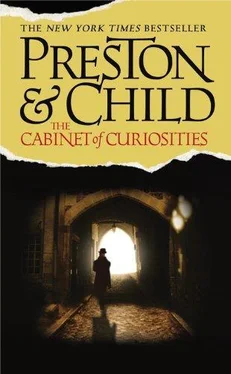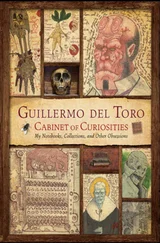Douglas Preston - The Cabinet of Curiosities
Здесь есть возможность читать онлайн «Douglas Preston - The Cabinet of Curiosities» весь текст электронной книги совершенно бесплатно (целиком полную версию без сокращений). В некоторых случаях можно слушать аудио, скачать через торрент в формате fb2 и присутствует краткое содержание. Жанр: Триллер, на английском языке. Описание произведения, (предисловие) а так же отзывы посетителей доступны на портале библиотеки ЛибКат.
- Название:The Cabinet of Curiosities
- Автор:
- Жанр:
- Год:неизвестен
- ISBN:нет данных
- Рейтинг книги:3 / 5. Голосов: 1
-
Избранное:Добавить в избранное
- Отзывы:
-
Ваша оценка:
- 60
- 1
- 2
- 3
- 4
- 5
The Cabinet of Curiosities: краткое содержание, описание и аннотация
Предлагаем к чтению аннотацию, описание, краткое содержание или предисловие (зависит от того, что написал сам автор книги «The Cabinet of Curiosities»). Если вы не нашли необходимую информацию о книге — напишите в комментариях, мы постараемся отыскать её.
The Cabinet of Curiosities — читать онлайн бесплатно полную книгу (весь текст) целиком
Ниже представлен текст книги, разбитый по страницам. Система сохранения места последней прочитанной страницы, позволяет с удобством читать онлайн бесплатно книгу «The Cabinet of Curiosities», без необходимости каждый раз заново искать на чём Вы остановились. Поставьте закладку, и сможете в любой момент перейти на страницу, на которой закончили чтение.
Интервал:
Закладка:
THE MAN WALKED up Riverside Drive, his steps short and precise, the metal ferrule of his cane making a rhythmic click on the asphalt. The sun was rising over the Hudson River, turning the water an oily pink, and the trees in Riverside Park stood silently, motionless, in the chill autumn air. He inhaled deeply, his olfactory sense working through the trackless forest of city smells: the tar and diesel coming off the water, dampness from the park, the sour reek of the streets.
He turned the corner, then paused. In the rising light, the short street was deserted. One block over, he could hear the sounds of traffic on Broadway, see the faint light from the shops. But here it was very quiet. Most of the buildings on the street were abandoned. His own building, in fact, stood beside a site where, many years before, a small riding ring for Manhattan’s wealthiest young ladies had been. The ring was long gone, of course, but in its place stood a small, unnamed service drive off the main trunk of Riverside, which served to insulate his building from traffic. The island formed by the service drive sported grass and trees, and a statue of Joan of Arc. It was one of the quieter, more forgotten places on the island of Manhattan — forgotten by all, perhaps, save him. It had the additional advantage of being roamed by nocturnal gangs and having a reputation for being dangerous. It was all very convenient.
He slipped down a carriageway, through a side door and into a close, musty space. By feel — it was dark, with the windows securely boarded over — he made his way down a dim corridor, then another, to a closet door. He opened it. The closet was empty. He stepped inside, turned a knob in the rear wall. It opened noiselessly, revealing stone steps leading down.
At the bottom of the steps, the man stopped, feeling along the wall until his fingers found the ancient light switch. He twisted it, and a series of bare bulbs came on, illuminating an old stone passageway, dank and dripping with moisture. He hung his black coat on a brass hook, placed his bowler hat on an adjoining hat rack, and dropped his cane into an umbrella stand. Then he moved down the passageway, feet ringing against the stonework, until he reached a heavy iron door, a rectangular slot set high into its face.
The slot was closed.
The man paused a moment outside the room. Then he reached into his pocket for a key, unlocked the iron door, and pushed it open.
Light flooded into the cell, revealing a bloodstained floor and wall, chains and cuffs lying in disorganized bands of metal.
The room was empty. Of course. He swept it with his eyes, smiled. Everything was ready for the next occupant.
He closed the door and locked it again, then proceeded down the hall to a large subterranean room. Switching on the bright electric lights, he approached a stainless steel gurney. Atop the gurney lay an old-fashioned Gladstone bag and two journals, bound in cheap red plastic. The man picked up the top journal, turning its pages with great interest. It was all so wonderfully ironic. By rights, these journals should have perished in flames long ago. In the wrong hands, they could have done a great deal of damage. Would have done a great deal of damage, had he not come along at the right time. But now, they were back where they belonged.
He replaced the journal and, more slowly, opened the medical valise.
Inside, a cylindrical container of hard gray hospital plastic lay on a smoking bed of dry ice chips. The man pulled on a pair of latex gloves. Then he removed the container from the briefcase, placed it on the gurney, and unlatched it. He reached in, and, with infinite caution, withdrew a long, gray, ropy mass. Had it not been for the blood and matter that still adhered to the tissue, it would have resembled the kind of heavy cable that supports a bridge, the red-streaked outer lining filled with thousands of tiny, fibrous strings. A small smile curled the man’s lips, and his pale eyes glittered as he stared. He held the mass up to the light, which shone through it with a glow. Then he brought it to a nearby sink, where he carefully irrigated it with a bottle of distilled water, washing off the bone chips and other offal. Next, he placed the cleaned organ in a large machine, closed its top, and turned it on. A high whine filled the stone room as the tissue was blended into a paste.
At timed intervals, the man consulted the pages of a notebook, then added some chemicals through a rubber bladder in the machine’s lid with deft, precise movements. The paste lightened; clarified. And then, his movements ever so careful, the man detached the ultrablender and poured the paste into a long stainless tube, placed it in a nearby centrifuge, closed the cover, and turned a switch. There was a humming noise that grew rapidly in pitch, then stabilized.
Centrifuging out the serum would take 20.5 minutes. It was only the first stage in a long process. One had to be absolutely precise. The slightest error at any step only magnified itself until the final product was useless. But now that he’d decided to do all further harvesting here in the laboratory, rather than in the field, no doubt things would proceed with even greater consistency.
He turned to the sink, in which sat a large, carefully rolled towel. Taking it by one edge, he raised it, letting it unroll. Half a dozen bloodstained scalpels slid into the basin. He began to clean them, slowly, lovingly. They were the old-fashioned kind: heavy, nicely balanced. Of course, they weren’t as handy as the modern Japanese models with the snap-in blades, but they felt good in the hand. And they kept an edge. Even in this age of ultrablenders and DNA sequencing machines, old tools still had their place.
Placing the scalpels in an autoclave to dry and sterilize, the man removed the gloves, washed his hands very carefully, then dried them on a linen towel. He glanced over, checking the progress of the centrifuge. And then he moved to a small cabinet, opened it, and withdrew a piece of paper. He placed it on the gurney, beside the briefcase. On the paper, in an elegant copperplate script, were five names:
Pendergast
Kelly
Smithback
O’Shaughnessy
Puck
The last name had already been crossed out. Now, the man plucked a fountain pen of inlaid lacquer from his pocket. And then — neatly, formally, with long slender fingers — he drew a beautifully precise line through the fourth name, ending with a little curlicue flourish.
EIGHT
AT HIS FAVORITE neighborhood coffee shop, Smithback lingered over his breakfast, knowing the Museum did not open its doors until ten. Once more, he glanced over the photocopies of articles he’d culled from back issues of the Times. The more he read them, the more he was sure the old murders were the work of Leng. Even the geography seemed consistent: most of the murders had taken place on the Lower East Side and along the waterfront, about as far away from Riverside Drive as you could get.
At nine-thirty he called for the bill and set off down Broadway for a bracing fall walk to the Museum. He began to whistle. While he still had the relationship with Nora to repair, he was an eternal optimist. If he could bring her the information she wanted on a silver platter, that would be a start. She couldn’t stay mad at him forever. They had so much in common, shared both good and bad times together. If only she didn’t have such a temper!
He had other reasons to be happy. Although every now and then his instincts failed him — the thing with Fairhaven was a good example — most of the time his journalist’s nose was infallible. And his article on Leng had gotten off to a good start. Now all he needed was to dig up a few personal nuggets to bring the madman to life — maybe even a photograph. And he had an idea of where to get all of it.
Читать дальшеИнтервал:
Закладка:
Похожие книги на «The Cabinet of Curiosities»
Представляем Вашему вниманию похожие книги на «The Cabinet of Curiosities» списком для выбора. Мы отобрали схожую по названию и смыслу литературу в надежде предоставить читателям больше вариантов отыскать новые, интересные, ещё непрочитанные произведения.
Обсуждение, отзывы о книге «The Cabinet of Curiosities» и просто собственные мнения читателей. Оставьте ваши комментарии, напишите, что Вы думаете о произведении, его смысле или главных героях. Укажите что конкретно понравилось, а что нет, и почему Вы так считаете.










